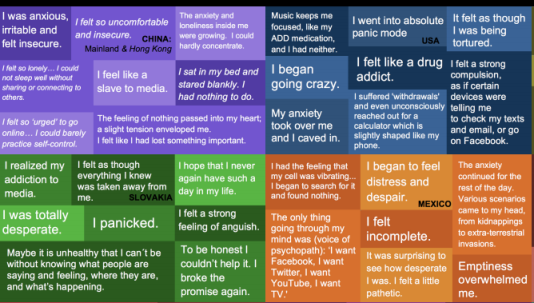My first couple of years of college, as I struggled with balancing my suddenly unlimited Internet access with maintaining good grades and an active social life, I often wondered if I was addicted to the internet. I often wondered why I was the only one who seemed to be affected so deeply by this. It seemed like none of my friends needed the Internet as badly as I did.

Yet I’m increasingly finding out that, however my friends may be, I’m hardly unique in my obsessive relationship to technology. This is particularly apparent in a recent study conducted by the University of Maryland’s International Center for Media and the Public Agenda ,which had 1,000 college students from around the world go without any media at all — including the Internet, television, music players and even cell phones — for 24 hours. Their website for the project, called the world UNPLUGGED, details the results. Across the world, nearly all the students reported feeling deprived and lonely without their technology, some more extremely than others.
An infographic of sample responses shows the similarities of responses around the world, in countries with vast differences in culture, political climate and socioeconomic status:
From the UK: “Emptiness. Emptiness overwhelms me.” “Unplugging my Ethernet cable felt like turning off a life-support system.” “I feel paralyzed — almost handicapped in my ability to live.”
From Lebanon: “I kept hearing the sound of my Blackberry messenger ringing over and over in my ears…It was haunting me!” “I couldn’t not listen to music. I listened to almost 40 seconds of a song and then I was ‘satisfied.’”
From China: “I sat in my bed and stared blankly. I had nothing to do.” “The feeling of nothing passed into my heart…I felt like I had lost something important.”
From Uganda: “I felt like there was a problem with me.” “I counted down minute by minute and made sure I did not exceed even a single second more!” “I felt so lonely.”
From Mexico: “The anxiety continued for the rest of the day. Various scenarios came to my head, from kidnapping to extra-terrestrial invasions…”
Multiple students described themselves as “addicted,” and one student from the US even said, “I felt like a drug addict.”

But is “Internet addiction” a legitimate addiction, one that deserves specific treatment? Regardless of any scientific proof, opportunists have begun creating special clinics for people with “net addictions,” such as this one in South Korea or this one in Washington State.
In a 2009 article for The Daily Beast, Winston Ross tells the story of how “Internet addiction” left his brother homeless while reporting on the Washington clinic, Re-START.
A recent article in Utah’s Deseret News describes a marriage that broke up as a result of “Internet addiction”; Ashley Yates’s husband spent so much time playing online games it caused him to fail out of medical school and neglect his wife, leading to divorce.
Then there are the really scary stories where addiction to online games has resulted in parents starving or murdering their own children.
But ultimately, anecdotes aren’t data. There’s no solid research to support the idea that the Internet is inherently addictive.The world UNPLUGGED study itself was carried out primarily by journalism students, not students in psychology or medicine, making it difficult to draw any conclusions from it about technology-obsession as a medical condition.

Many psychologists recognize compulsive online behavior as a form of escapism that is more likely a symptom of a larger problem, such as anxiety or depression, rather than an addiction all its own.

Whether it’s real or not, though, “Internet addiction” has one major stumbling block that separates it from other addictions: cold turkey isn’t an option. Electronic media has become an essential part of our lives, needed for success in the academic and work worlds, as well as for personal communication. As Greg Beato writes for Reason.com :
On a pound-for-pound basis, the average World of Warcraft junkie undoubtedly represents a much less destructive social force than the average meth head. But it’s not extreme anecdotes that make the specter of Internet addiction so threatening; it’s the fact that Internet overuse has the potential to scale in a way that few other addictions do. Even if Steve Jobs designed a really cool-looking syringe and started distributing free heroin on street corners, not everyone would try it. But who among us doesn’t already check his email more often than necessary? As the Internet weaves itself more and more tightly into our lives, only the Amish are completely safe.








Comments
Hi. My name is Andi. I am addicted to technology.
Hello Andi. Thank you for sharing. By admitting you have a problem, you are already on the path to redemption. The path to FREEDOM. *looks smug and satisfied whilst audience claps*
Don’t bet on the Amish, I’ve met some with iPhones.
No joke.
The interwebs shall not be ignored!
But…but…the Amish don’t have *buttons*! How the hell do they justify iPhones?!? Are you sure they’re not plain dress Mennonites? Because those are different than Amish, but they do dress similarly.
That’s why they have touch-screens!!
xD kekekeke
A++++
seriously i know a family that has solar panels installed on their house. the dad is a radiologist and the girls like photography (digital) a lot. so….yeah they do quite a bit with technology
There is no way that family is Amish. Maybe they’re *formerly* Amish. But if they’re doing all that and are not single young people on Raumspringa, they’re not currently Amish. They could be Mennonites, who are often mistaken for Amish.
Yeah, knowing what little I know about the Amish, I’m pretty sure these people are Old Order Mennonites, who are allowed some contact with technology (they drive cars, for example).
Mennonites justify using technology as long as it helps their agricultural or other types of businesses. So, cars and electric equipment is okay – TV and iPhones are not.
From what I have heard each community makes it’s own decisions on these things. While still abiding by simplistic ideals if it is deemed appropriate that tractors can be used on Wednesdays only for potato crops than it can exist. I have a feeling that they are a more varied group(s) than at least I had previously imagined.
Also, no lie, the kid that had the iPhone said “I like to play with it when I’m bored.” And as far as I know he was straight up Amish beardness and all.
It’s possible for certain people to become addicted to a thing that’s not inherently addictive.
I’ve been using the Internet since the mid-1990s and I’m not addicted. Actually, I go through phases where I don’t check Twitter or Facebook because I need a break from people.
pretty sure im addicted to social networking via the internet whoops
last Lent, i gave up the internet. so from after mardi gras to easter i didn’t go online (only for school which wasn’t much). i actually had dreams that i went online! but thanks to it, i kicked my facebook addiction. but i can’t even imagine going without ALL media!
The internet is pretty much the only thing preventing me from getting excited about a zombie apocalypse. What the f*ck would I do then?
internet i understand
i mean i deleted basically everything except this AS account, a tumblr, and email when life got too much
but MUSIC???
come on
if we all had personal bands that knew every song in history follow us around, maybe i could give up my ipod
but i don’t think not listening to music is a virtue
in fact i think it’s completely the opposite
Yeah, as a composer and music major personally I don’t think I could go without music. And I probably wouldn’t be able to justify it either, since it’s for school!
I have an issue with the word “addiction.”
I feel its used way too easily, somewhat similar to calling alcoholism a disease… true diseases aren’t curable by will power.
Just like true addictions wouldn’t be able to be studied like this, since they would be addictions… not something just halted one day for a study. Sure, it was uncomfortable for them, but that’s hardly an addiction.
To be honest, I personally believe most things can be fixed if you can somehow teach someone to have a stronger will… I think most of these things show a weakness of internal strength. (Not to insult anyone reading)
I also think the “study” was way too short… its like, still a period of shock. I suspect that if the study was longer (if you could find people to get involved in it, in today’s world…) people would adjust fairly quickly.
‘Not to insult anyone reading’, well good call. Except for all those with serious addiction/mental disease you just called weak-minded…
Honestly, people who dismiss addiction like this, saying it’s just about “willpower,” are way worse for addicts than the casual labeling of every compulsion as an “addiction”… The idea that it’s just “weak mindedness” and that they can cure it if they just try hard enough is part of what keeps a lot of people from seeking the help they need.
Have you ever struggled with a serious addiction or seen someone struggle with it? Because I don’t see how someone who has can make the generalizations you’re making here. Not everybody who sometimes drinks a little too much at parties is necessarily an “alcoholic,” you know. I’ve seen people close to me struggle with severe alcoholism (like, they can’t so much as drink a few sips of wine without triggering it), and for a lot of people, it really ISN’T something you can cure by willpower. They need to see doctors and psychiatrists to get on a plan to get off alcohol. Alcohol withdrawal can also have serious medical consequences, even death. You’re also arguing against genetics here; there is a known gene for a dopamine-receptor variation which can make people more susceptible to alcohol or drug addiction.
“Internet addiction” is on shaky ground, but the evidence is clearly against you when it comes to alcoholism or drug addiction. It’s clearly not just due to a lack of “willpower.”
Yep, I’m a techno addict. The worst is if the hydro goes down! 2 minutes in I start to panic.
I totally identify with the concept of the internet addiction being a symptom of a larger problem. I am a classic example of using the internet as escapism from my anxiety.
Not healthy but safer than a lot of other coping mechanisms.
My little bro dropped out of high-school to spend his life playing WoW, and my morning ritual goes something like:
1. Check if I drunk texted/called/FBed/straddled anyone.
2. Damage control if 1.
3. TUMBLR
So maybe it’s genetic….
I just got the tumblr app for my phone, and that was literally the best thing that happened to me all of yesterday. TUMBLR. ANYWHERE.
I totes wanna try being abstinent from the internet. Would anyone (preferably cute and lesbian, not wearing much) deliver Autostraddle to my house in print every morning?
A few weeks ago I completely lost wireless internet at my house for almost a week. Towards the end of it I started taking my laptop with me when I went to friends’ houses so I could get online at their places instead of hanging out with my friends. It was rough.
so i totally forgot about this fact yesterday when i read this article: orthodox jews do this very “experiment” every week. if you’re a religious orthodox jew and observe the sabbath, you don’t use any technology/electricity (among other things) for a 25-hour period starting friday night and ending saturday night.
so.
this is a thing.
good point! i can’t believe nobody above you in the comments, or rose, thought of this.
It would drive me up a wall to be cut off from all media. No access to news or music, and since they took away cell phones no way to contact friends or family, that sounds like the definition of hell.
i did the ‘no internet for 24 hours’ thing once. it was great, i cleaned my desk and found $140 just sitting there in really old birthday cards. i did ‘activities’ like ‘making art with my hands’ and read a book and an actual human being came over to my house. then the next day i blogged about it.
I dig this comment
award this!
Drama.
After the 24 hour period passed they would have found something to do.
This is totally relevant to my interests because our power went out yesterday and, 25 hours later, is still out. I had to leave, I couldn’t take it anymore. So no Internet for me (and, what’s worse, no TV either). And then no A/C, so I was hella agitated. I kept thinking, “Damn, I’m bored… I’ll get on Tumblr!” and then remembering NO YOU CAN’T GET ON TUMBLR. It was painful. I almost had a panic attack. It’s like losing your right hand and then going to pick something up and thinking, “Oh, I’ll just use my right hand to grab this thing,” and then realizing YOU HAVE NO RIGHT HAND.
So I won’t have internet for a couple of weeks and this is insanely relevant. Am I sitting in my friend’s living room stealing her internet? I totally am.
Yeah, it’s a problem.
I don’t think I’m addicted, but whenever I am forced to be without the internet for some period of time, I think I’m far more deprived than I actually am. I feel like I’m lost, missing out, I don’t know what’s what. I recently spent a couple days in a place where I got zero cell service and had no wifi at my hotel. I felt like I was missing out so much, but once I got back and checked all my online stuff, I didn’t really miss anything. What I was doing was the more interesting, noteworthy thing. Still, how many times did a thought pop into my head that I wanted to google? It bugged me so much. Google is an extension of my brain. I remember life pre-google. Not since google have I ever been left to wonder anything. I always answer my own questions. There was a study that since the advent of google and the internet, people don’t remember stuff as much because they know they can google it or retrieve it online somehow later. It’s a helpless feeling to have to actually wonder about something.
I do think the internet is super easy, super convenient, it’s always there and it’s easy to spend way too much time. Whether it’s talking to friends, reading blogs, playing games, watching videos, going down news/Wikipedia rabbit holes, I definitely waste time online instead of doing other things I probably should be doing. Whether it’s work, chores, gym, cooking, reading actual books, etc., I definitely think the internet takes away from that. But I also think I tend to procrastinate and waste time anyway and I can’t blame the internet for it.
I’m not addict to Internet..I’m addict to the sharing of information..
(No, I actually really had a problem with this. I left two universities for this but now I’m ok, kinda)
Rugby save my life. No kidding
I think what’s weird is when you’re out in public, hanging out with friends who spend a lot of time on the internet/on their phones/etc., it always seems like they’ve got something better to do than be there with you. But when you really stop to think about it, they really don’t. Later that night you’ll see them on facebook just like earlier when you were together and they were on facebook… mobile.
Another weird thing I’ve noticed is the advent of the ‘cultivated personality,’ as I like to call it, that is only available because of social networking. I’ve caught myself doing it. It goes like this: you get a facebook, or a tumblr, or an autostraddle account, and then when you go to update what people can see about you, it’s almost like you’re engineering it so everyone can see /just/ how cool you are. Maybe, deep inside, you know you’re not that awesome. But your ego got so big that now, when you take pictures with your friends, you’re going to inevitably upload them to facebook so that your friends can see how bumpin’ your social life is. And the music you ‘liked’ will reflect your classy and refined taste in music, and your tumblr page will show just hot quirky you are, and maybe all this will make someone want to talk to you. Besides the people you already know. It’s like a subtle popularity race and it’s strangely terrifying. Because even ten years ago it would have been pathetic to post on your primitive blog something like, “ask me anything, ANYTHING you want because I am super bored tonight!” and you wouldn’t have even been able to follow it up with a cute .gif file because PEOPLE DIDN’T USE THEM THEN. To think that, in the year 2011, when there are over 6 billion people in this weird, that we would be SO incredibly lonely that we would basically BEG other people to ask about us on the internet is just… weird. And it’s stupid. And why am I still writing. I have many feelings!
Hah, good points. Social networking is a strange beast. I have a very ambivalent relationship with it, but I certainly catch myself projecting myself a certain way, as you describe. I realized today that I don’t put my college info because I’m embarrassed it wasn’t a great college, but I put my last couple jobs up because I’ve managed to be pretty successful in hat regard. It’s a bit weird. Sometimes I’d like to delete my Facebook altogether, but then I realize I would have no connection to a lot of people then, including people I want to network with. Posting on my former boss’ wall to wish her a happy birthday once a year and maybe 2 or 3 other status responses per year is better than nothing, right? Sigh.
Definitely! Who really posts status updates that often, anyway? But I agree. It’s a strange world out there.
I totally agree with all of this! I don’t get why people need to check their phones every couple of minutes to see who updated their status on Facebook…especially if they are in my company. Am I that boring or has it all become some sort of a habit?
I read my response over and I’m embarrassed at how many mistakes I made. Forgive me!
It was deep and I could relate but I don’t have an active facebook account because I am better than that….jk I just want to” make” my life seem more important but I do not have much going on…yeah. your post, so many feelings that I feeeeeeeel.
The world is a smaller and more narcissistic place.
I completely agree. It’s the “me” generation, everything is personalized, if it has your name on it, it’s cool, etc. I’m glad my feelings are sort of universal though :)
Just because i can’t live without the internet, doesn’t mean I’m addicted, does it?
*cough*
Seriously though, I’m sure I could get by without it, it just would be annoying. I’ve been a pretty heavy internet user since the mid 90’s, when I was a young teenager. So I’ve been with this darn thing from when it was awkward as hell to use, and now it’s so easy, and so it’s second nature.
If I’m addicted to anything, it’s the sourcing of information. I read a pretty ridiculous amount of news, and absolutely LOVE learning new things, so having my smartphone/PC/laptop is absolutely key to my day-to-day life.
My computer has been broken for over a week. I seriously have been so on edge in the past week. I need a hotline.
my laptop is half broke (the mouse and key board goes haywire every now and then) and i could replace it for free with my insurance but…its going to take too long [for my comfort] to get here…
I think I can do without internet for a while. Or rather I could if I had to for weeks or months. The problem is other people. For instance, the people who send email messages expecting immediate responses (classmates, employers, companies, etc) and the assignments I have to submit electronically that won’t send themselves. God, just thinking about my school/work email inboxes get me anxious – sooo many emails all screaming for my attention. I forever feel behind on them.
And those people who are constantly on their smartphones texting, checking email, FB, Twitter, etc — even when out with people — are so annoying to me. I don’t mind it when you are on your own but if you are out, just enjoy yourself and have fun with the people you are with and stop that damn texting. Almost as annoying as the guys who walk around with their bluetooth headset in their ears (even when they are not currently on a call).
With all that said though, I can’t imagine wanting to be without the internet for too long. Nowadays I am always saying that “I can live without TV. In fact, I hardly ever watch live TV. I don’t need my phone either. But the internet. The internet is my TV, my phone, my connection with family/friends all over the world and basically my life.” :P
http://SoNotStraight.tumblr.com